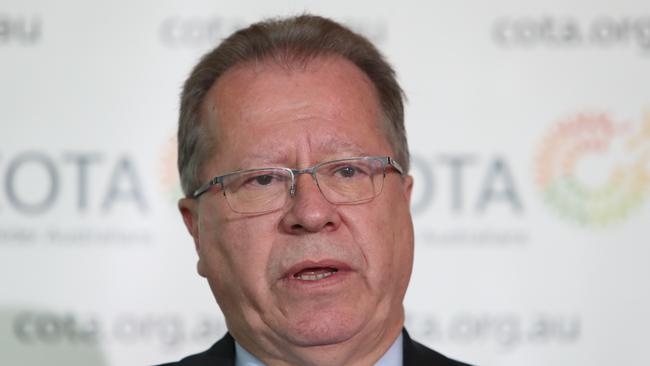Coronavirus: plea for the elderly: don’t cut them off
Ian Yates says measures have to be flexible, proportionate and precautionary, with no blanket rules.

The elderly must have “appropriate access” to loved ones amid the coronavirus crisis, the peak body for older Australians says, as aged-care providers are encouraged to limit visits under new guidelines.
Scott Morrison is to announce visitor restrictions for aged-care facilities on Wednesday in a bid to protect the elderly, who are especially vulnerable to the virus.
Council on the Ageing chief executive Ian Yates said measures had to be flexible, proportionate and precautionary, with no blanket rules, because not having contact with family members could be distressing. “One of the things being tossed around was we should limit a resident to one visitor per day. My very quick retort to that is, what if the daughter (of the aged-care resident) is bringing the spouse to visit the other spouse? You can’t say the two of you can’t come in,” he said.
“You properly wouldn’t have the local kindergarten visiting group come through but it’s about making sure people have appropriate access to loved ones.
“If someone is actually near the end of their life, you have to think about appropriate arrangements for that.”
The five Australians who have died from coronavirus have been aged in their 70s, 80s and 90s.
COTA estimates about 800,000 Australians are receiving some kind of aged-care support at home, compared with 200,000 in nursing homes.
The Communicable Disease Network of Australia has issued precautionary measures for aged-care residents, staff and families, including to limit visits to facilities.
“Given the risks to older Australians from COVID-19, particularly those with chronic disease and other frailties, we recommend that residential aged-care providers restrict visitor access,” Aged Care Minister Richard Colbeck said. “Our plan is to slow the spread, to save lives.”
While he did not specify what restrictions were necessary, he said they would be handled “professionally and sensitively”.
Mr Colbeck acknowledged the emotional burden such measures would have on families of residents in palliative care.
Mr Yates said elderly people “should not be locking the doors and battening up the windows” as social isolation could have major physical and mental health impacts, but they should be more cautious than young people about crowds, travel and their physical interactions with people, especially with strangers.
“It’s about being ultra-sensible but not stopping your life. They should be able to go to the shops, they should be able to go to the bank and to the post office. If everybody is following guidelines about social distancing, that would be respected,” he said.
“If you don’t have significant chronic health issues, you might feel as comfortable as anybody flying. If you do (have chronic health issues), it might be worth having a chat to your doctor about it, taking some advice and maybe just postponing (your trip).”
Leading Age Services Australia chief executive Sean Rooney said infection control was core business for aged-care providers and many were ahead of the curve:
“Some homes have undertaken intensified security measures including preventing entry for everyone except essential staff or contractors, with all people admitted subject to intensive screening,” Mr Rooney said.
Britons older than 70 are expected to be asked to self-isolate for an unknown period, which Mr Yates said risked undermining their sense of respect and dignity.




To join the conversation, please log in. Don't have an account? Register
Join the conversation, you are commenting as Logout